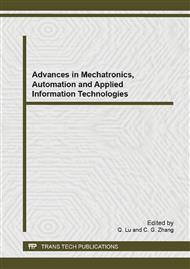p.274
p.278
p.283
p.288
p.293
p.297
p.301
p.305
p.309
Off-Line Robust MPC Algorithm for VAV Air-Conditioning Systems
Abstract:
The efficient temperature control of variable air volume (VAV) air-conditioning system can greatly reduce the energy consumption. In order to due with system constraints and uncertainties, and guarantee the closed-loop stability, an off-line min-max robust model predictive control algorithm is presented for the temperature control of a VAV system. As the first-order-plus-time-delay model of system is described by a polyhedral described uncertain model, the off-line ellipsoidal invariant set based robust MPC algorithm is employed for the controller design. Simulation results show efficiency of the proposed control algorithm implemented in the temperature control of a VAV system, which can enhance robustness, and satisfy the constraints.
Info:
Periodical:
Pages:
293-296
Citation:
Online since:
November 2013
Authors:
Keywords:
Price:
Сopyright:
© 2014 Trans Tech Publications Ltd. All Rights Reserved
Share:
Citation:


